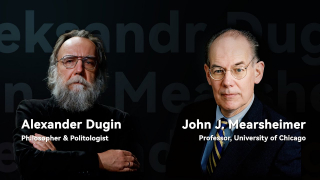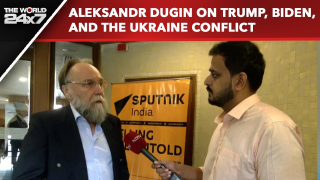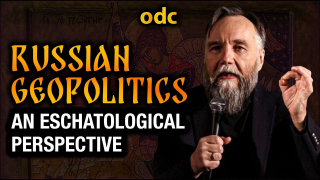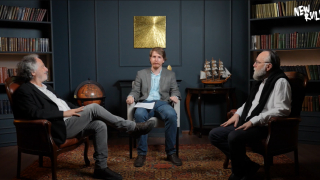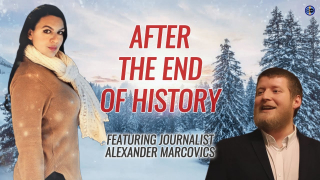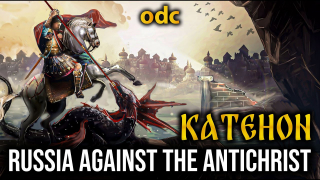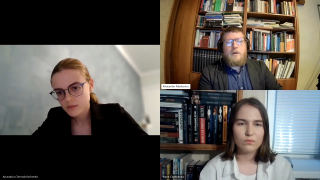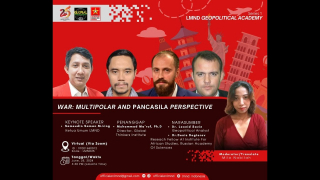The challenges of modern traditionalism
The International Conference ”From Atlantic to Pacific: For a common destiny of the peoples of Eurasia”
Levan Vasadze (Georgia)
The Challenges of Modern Traditionalism
Good morning. Thank you, professor Dugin. It is a pleasure and privilege to be attending the meeting of conservative intellectuals in Chișinău. What a pleasure to be in Moldova with our dear friend Iurie Rosca and all of you. We look like a group of utopian conspirers. I will try to be in the trend of this mood, I will joy and speak about my utopian ides. I decided to call my short address this morning “The Challenges of Modern Traditionalism”.
We have devoted close to 25 years after the collapse of communism, hegemony and establishment of monopoly of liberalism to our quest and struggle against totalitarian liberalism. Some of us came into this fight earlier, immediately after the collapse of Marxism or communist system, some of us, perhaps due to our age and personal evolution, have joined this struggle later. But, nonetheless, we can state with certain degree of accuracy, that by the middle of 2010’s in the XXI century, very little people of age above 35 or 40, with proper degree of conscience and decency, can remain in liberalism. There are only two types of people who can believe in the narrative of Western civilization: naive fools or cynics, and I think this narrative is exhausted by now completely. Therefore, if you are with liberalism today you are either a complete cynic, or a complete fool.
Having arrived at this time and at this stage, what do we see? We see that liberalism was a beautiful and enchanting dissident to communism and we were to different degrees hijacked by its beauty. However, when left alone, it started eating itself and started contradicting itself and it became a much uglier, much more ruthless and brutal form of totalitarianism than we have seen, I am afraid, in fascism or communism. We all, from different countries, the traditionalists, the representatives of intellectual religious tradition, one by one have begun resisting it. Liberalism came into our countries via different forms of influence. I would say the more west you go, the more ruthless the occupation of liberalism is. In some countries its influence, hegemony and despotism is mainly manifested though economic measures, in some countries though political measures, but universally, across the globe, I would say that liberalism kills and makes unhappy more people than any other form of totalitarianism that we have seen up until now. Therefore, we, the fragmented representatives of tradition, have started coming together through friendships and forums like this and thinking what to do.
We are finishing the first quarter of a century of deconstructing liberalism, of opposing liberalism, of criticizing liberalism and I am here to share my opinion with you that I think this is enough. This is not to say that we need to stop criticizing this form of totalitarianism, but I think enough has been said about what we do not want, about what is unacceptable for us in the modern totalitarian liberal system. The main challenge of traditional discussion as I see it ahead of us, is to move from being dissidents to being the creators. Because, if we do not do this, we run the risk that has killed the liberalism. Liberalism was a beautiful dissident to communism, like I said, but with the collapse of communism it has completely lost its function. If we do not want to share that fate of dying together with liberalism, we, the representatives of tradition, are faced with an extremely difficult, yet very inspiring challenge of reinventing ourselves from negative into the affirmative narrative of tradition.
I came today to share with you some of my humble views - you will find them very raw, very initial, very unprepared - on what should be the components or the vectors of that narrative, what should be the constituency or the backbone of our positive narrative, our affirmative narrative of tradition in the post liberal era. I don’t want to sound naïve and overly optimistic, I do realize that liberalism is just a wounded dragon which will be dying for the rest of our lives. Most likely, it will shed more blood than we have seen shed from communism or fascism or perhaps both of them combined and God forbid many of us may not live to the point of seeing the dragon - that Saint George had prevailed - is dead. Nonetheless, we are already – and I think we all share this opinion – in the era of dying dragon. And therefore, if we want to avoid becoming another dragon ourselves, if we want to avoid becoming the authors of the fourth totalitarian form, the fourth horse of apocalypses – which will be presented to us anyway by the authors of the first three forms of totalitarianism: the liberalism, the Marxism and the fascism – if we want to avoid being sucked into that deadly stream of alternative creation of another form of despotism, we need to think about how to reconstruct to the tradition and go back to it.
As professor Dugin rightfully says in many of his lectures and books, the individual subjects or the centers of three mentioned totalitarianisms were each different: liberalism centered on Cartesian individual, which is an artificial concept; Marxism centered on class and Nazism - or fascism - centered on race. The deconstruction of these has happened in the reverse chronology, as we know. Communism dragged down - brought down - and collapsed the idea of supremacy of the race; and then liberalism brought down and collapsed the idea of supremacy of the class; and the oldest one of the three, which was initially invented, has remained as the standing beauty without any alternatives. Now we are entering the era of destroying the liberalism and the supremacy of the individual. I have had the honor and pleasure of discussing on numerous occasions with professor Dugin and the some of you what should be the center of the post liberal paradigm, of the normal society. And we all have different opinions, not necessarily contradictory to each other. For example, professor Dugin tends to gear towards the idea of people - people of the empire if you will - as the carrier and the center of the alternative matrix. I tend to favor more – and again I don’t think we are in contradiction here – the idea of family as the center of the alternative constitution. In Budapest yesterday I said that, in my humble opinion, all 193 constitutions on the planet need to be rewritten. The center of each constitution today is an individual and I am not an individual, I am a component, I am a part – I am a brother, I am a husband, I am a father, I am a son – and when I loose these I become the enemy of humanity. Therefore, it is not the rights of an individual that we should be protecting in these constitutions, it is the obligation of an individual towards the family and the rights of the family that we should be protecting in the constitution.
If and when we – meaning the traditionalists or the participants of traditional discussion – settle the argument or we may not settle the argument and say that in one case this may be the people of the empire, or in the case of the Caucasian country like Georgia it can be the family, we need to move on and discuss the seven areas without handling which we cannot, in my view, move into the affirmative narrative of the tradition. These seven areas may not be the complete list - some of them may be canceled or collapsed into each other - but this is again my preliminary and raw view of the work we need to do, if we want to avoid being just dissidents of liberalism.
First of all, the civil legal system needs to be completely revamped. I would divide the work to be done by traditionalists in the civil legal system into two hemispheres: one – the disinfection of the existing civil legal systems from the virus of liberalism. Every single constitution – except maybe for the North Korean or Cuban or some Islamic state – is completely infested and infected with liberal terminology, paradigms, clichés and viruses and they are beyond repair, if you ask me. I am not an expert on civil law, but from the very little that I know, these are all hopeless cases of “Perestroika”. Therefore, I would favor a complete rewriting of the constitutions, as I said. The second part of our work in civil legal system is the creative part. We need to disinfect and recreate the new legal system around the chosen center.
The second component, that we need to focus on, is the economics. We live in liberal economic paradigm, we criticize it, we do not like the Federal Reserve System, monopoly and hegemony, we do not like the dogmas of monetarism, we oppose it, but we rarely move beyond the negative criticism. We all tend to be lazy I think a little bit about it, and in my view, without offering the humanity the alternative of the structure of how the economic system should be constructed, we will be harmless to liberalism. Therefore, we need to create and we have some components in the Chinese system, I think Sergey Glazyev in Russia is a very interesting thinker, more so than professor Katasonov because he tends to give us more on the positive side, we have some interesting thinkers on the American side in alternative economic system, but the alternative economic model is to be developed.
Third: In those cultures and in those countries, where this is possible and desirable by tradition, we need to rethink and reinvent the model of the Monarchy. And what does it mean?! As we move into the alternative post liberal paradigm, we need to move into alternative architecture. I know that in some countries and cultures we will run into skepticism, and some of them will say, “What monarchy? What are you talking about? You are only further complicating the discussion”; but in some countries, such as mine – Georgia – or such as Russia, it is very organic concept and it needs patronage from the traditionalists and it needs attention. If left only to the mercy of monarchs or the descendants of the royal dynasties, you will inevitably end up with the lack of scientific and intellectual input, so the monarchy needs patronage.
Fourth area which needs to be reinvented is the formula between the State and the Religion or the main religious structure of the country. This is tabooed in liberalism, every religious tradition is just an artifact in the museum, which needs to be isolated and visited on Christmas, or through some derange antireligious movies and songs. Each country needs to go back to rethinking the formula. I think there are some interesting examples. For example, in Georgia we have an existing Concordat, which was signed in 1990’s, which considers our Church and our State equally important subjects and they have a deal between each other. It is another thing that everybody ignores the existing Concordat, but is exists. I think the case of modern state of Israel is worth paying attention to, but other than that there is very little – perhaps in the Islamic part of the world we can find more interesting cases of thought through structures of cooperation between the state and the religious tradition – but in this case the most important component in this discussion is to bring up to the front the idea, that we have two and not one hand, and within each country each tradition needs to treat its religious structure as attentively and importantly as its civil structure. Without this we are pseudo-traditionalists.
Fifth - is the defense strategy of the traditionalism. As I have talked about the dying liberalism and the agony of liberalism, I assure you that no one is going to live us alone. I am almost confident that the security forces of Moldova are currently very attentively listening to this meeting and more importantly, I would say, maybe not only them. Therefore, every meeting, every conversation among the traditional intellectuals is going to be very carefully monitored, and every action, if it dares to approach the real politics or practicality of life, will immediately be attacked. Therefore, traditionalism, if it needs to move from the chambers of dissidentship into the affirmative narrative, needs to have a thought-out, multi-level sophisticated defense strategy and we can talk about what it needs to be.
The remaining two components, which I want to invite all of us to think about, is de-urbanization and demography. De-urbanization is my second religion. I believe that we become devils in the city and we become humans in the rural area. I think city is evil, and I think village is good; I think city is matriarchal and village is patriarchal; I think in the city extra child constraints the family, and I think in the village extra child helps the family to inhabit the space; I think in the city we are pathetic, and I think in the village we are happy. We are all, as I have called in one of my lectures, unfortunately, homo-urbanicus-hedonicus to certain degree, and we need to reinvent ourselves – all of us – outside of the urban luciferian culture.
Demography, of course, is almost a self-evident concept, which we need to discuss and respond to. I am the chairman of Georgian Demographic Society. I work on this day and night as much I can and as much as my business allows. I think back to de-urbanization aspect there is very little we can do within the matrix of urbanization to improve our demography. It is obvious that if we want French to be saved from extinction, if we want Georgians to be saved from extinction, if we want Russians to be saved from extinction, this can only come from the rural traditions of our cultures. We can give some extra tax and money incentive, like very thankfully Viktor Orbán is doing in Hungary now, but this will have a dismal effect on the true picture. The feeding of our cultures, language, its beauty, literature, demography, everything comes from the village, which is dead now. We have uninhabited it, our cities have turned into magnets, which are sucked in our population and make them alcoholic, junky, homosexuals, and suicide maniacs. The cities of our countries in the post-modern paradigm have become like shining lights in the night, which draw the butterflies and kill them – our population. If the XX century was the century of urbanization, the XXI century - if humanity wants to save itself, if any culture wants to save itself – needs to become the century of de- urbanization.
These are the areas that I think we should be focusing on. There is, I would say, 10, 20, 30 years of work for all of us before we can say we have prepared anything.
Finally, what will happen if we do not do this?! If we don’t do this, what we are offered is complete death. I want to stress this very carefully. What we are going towards to is an absolute suicide. We are nearing an extinction of our ethnoses and our cultures. If we grew up in the concept of free life without, for example, depressing levels of personal debt, our children will not even know what it is all about; they will grow up since very young age in a paradigm where they will always want more than they have and as a result, by the time they will reach forty years age, they will be into the bank debts up to the neck. As a result they will be depressed, they will be collapsing their families, they will be alcoholic and they will be dying. I don’t want to scare you and I don’t want to darken the picture, but I think it’s obvious where we are going.
Now, my prognosis. My prognosis is terrible and I hope that I am wrong. But if I am not wrong, here is what it is. I think we have a huge war ahead of us coming up. I have arrived at this prediction of the war not through analytics or geopolitics, but through philosophy. For example, if I look at Georgia, my favorite motherland, it is dying from liberalism. The level of gangrene in Tbilisi is almost as bad as in Moscow, Paris or anywhere else. The people who are infected with this ideology are completely non-negotiable. You cannot get through to them, there is no argument or rational behavior that draws their attention to what is going on. They are zombies. I was one of them when I was young and I know how it works. When you look at thin gangrene, you see that it is growing – same picture in Belgrade, by the way, I doubt. I am not a doctor, but I know, that when you have a gangrene, you can only treat it with two methods: one is medicaments, antibiotics – so in this case it means Church, traditionalist narrative or conversation; and the other one is invasive, operational, “put gunpowder on the gangrene and explode it” if the medicaments do not treat it. In my unfortunate observation, I do not see the signs of medical treatment helping liberalist zombies of our cities. For example, in Georgia we have the great, I would say the greatest Patriarch in the world, for forty years speaking to the nation and nothing helps. These people continue changing color and becoming infected. You can say, that if the gangrene is not treatable by medicaments, so we die. But, I am a fanatical Georgian, and I know that we will not die, I know that Georgia is eternal until the Apocalypses. I risk being naïve, but this is who I am. Therefore, because I am a fanatical Georgian and because I see that medicamental treatment of liberalism is not helping, I arrive at the philosophical prognosis of the war. The war will come and the fire will have to clean out. Again, no one will be happier than me if I am wrong about this prognosis. I do not know where and when it will start, I am worried that it may start this year between Turkey and Greece, or Turkey and Russia – this is a historical region of risks for us. With or without the war – and I do not want to sound like a maniac, but maybe the war is the remedy in our quest – we are faced with these challenges.
I am very privileged and honored to be the part of this extremely important group. Professor Dugin has rightfully said, that it is very symbolic that President of Moldova, decided to meet it, because he understands I suppose, the importance of this conversation. I assure you that from my side I will do everything I can to be of help in these discussions and to contribute to the best of my ability to our traditional discussions.
Thank you.
Chișinău,
27th May 2017

